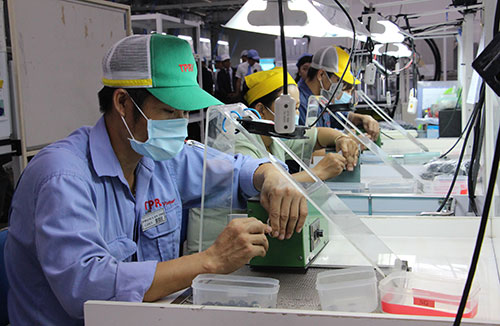Human resource development to meet the requirements of Industry 4.0
The Industry 4.0 is taking place all over the world. This fact affects the labor market, especially in countries that are considered to have abundant labor force like Vietnam. How to improve the quality of human resource to meet the requirements of new era is a matter for Asian countries, especially Vietnam.
To enhance the role of education
At Asia Labor Market Outlook seminar within Horasis 2018, speakers affirmed that in Asian developed countries, the economic structure was shifting rapidly towards technological development and highly-educated workforce. Industry 4.0 encourages the market shift towards favoring highly-educated workforce. It was forecast that the simple labor market in Asia would be difficult to adapt to Industry 4.0. Therefore, businesses in the region need to change management and labor thinking; educational institutions need to direct education towards application.

A production line of TPR Vietnam Company.
According to experts at the seminar, there are four decisive factors for enterprises to develop in the new period: Development strategy of enterprises; application of technology; databases and artificial intelligence. This requires businesses to use high-quality human resources for their development progress.
The majority of delegates agreed that the solution to the above factors was the renovation of teaching methods at all levels, especially at vocational schools in Asia. Education planners must answer questions, like what this is, how to operate, respond to which problems of businesses.
However, in the age of Industry 4.0, in addition to specialized knowledge, workers must own soft skills, including self-study, adaptive, communication, problem solving. The most attractive topic was that who would teach workers these skills; whether schools are capable to equip students with these skills; is it too much to expect all from education, while some can be equipped from the community, family... Businesses could also give training to develop skills for workers.
Delegates from some countries, such as Singapore and India, said their education could meet the above-mentioned skills, although many delegates said it was difficult to assess the satisfaction level. In fact, every country, every business in each stage has a different requirement; there is no common denominator in terms of skill requirements for workers.
Workers need to actively change themselves
According to experts, Vietnam is in the period of international integration. When acquiring appropriate professional knowledge and skills, Vietnam would meet well and benefit from the development and would be an attractive investment destination for businesses from all over the world. At present, the continuous renovation in education and vocational training is an important objective of the National Socio-Economic Development Strategy; the need for quality improvement of the workforce will be the key to continuously modernize the economy and sustainable development in Vietnam.
Currently, with many opportunities for economic development opened up by the integration into the world economy, Vietnam's demand for human resources is expected to increase sharply. In order to meet employment demands of the labor force, the Vietnamese economy needs to create annually about 650,000 new jobs every year. Abundant labor force is a great advantage of Vietnam in comparison with other countries in investment attraction.
However, with the common trend of Asia, the market would require higher qualifications of labor force. The healthy young work force previously hadan advantage, now have fewer opportunities compared with the workforce with good knowledge and skills.
Under current conditions, vulnerable workers are simple workers; these workers face the risk of losing their jobs or failing to meet requirements of new jobs. Therefore, education and training should be paid more attention by countries as well as Vietnam in order to improve the productivity and skills of low-skilled workers.
Talking about the direction to promote the development of Vietnam's abundant labor force, said Tetyana Kretova, Director of Ie Business School in Asia-Pacific region, the growth of information technology formed the different work structure. Today businesses require a lot from workers. Therefore, each person needs to focus on soft skills and self-learning skills. Viet Nam has a young population and diverse labor source, but according to the general assessment, Vietnamese workers are limited in terms of the above two skills. Vietnamese workers should actively change to adapt to the times, take advantage of the wide open employment opportunities.
Reported by Tieu My – Translated by Ngoc Huynh

